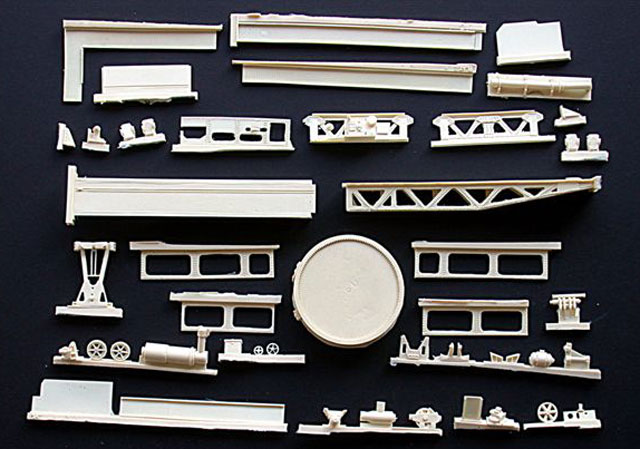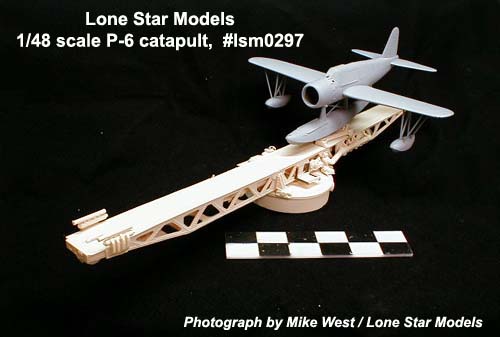|
US Navy P6 Catapult

Lone Star Models, 1/48 scale
S
u m m a r y
|
| Catalogue Number: |
Lone Star Models' US Navy P6
Catapult |
| Price: |
USD$125 from Lone Star Models
http://www.lonestarmodels.com |
| Scale: |
1/48 |
| Contents and Media: |
46 parts in cream-coloured resin |
| Review Type: |
FirstLook |
| Advantages: |
Well detailed; well cast; great
display for US Navy aircraft. |
| Disadvantages: |
Some DIY; a few air bubbles in
cradle |
| Recommendation: |
Recommended |

HyperScale is proudly sponsored by Squadron.com
Reviewed by
"Bondo" Phil Brandt
The iconoclastic “Resin Prince of Sugar Land”, Mike West, can always
be counted upon to release esoteric products, and the long-awaited P6
catapult certainly meets this criteria in spades, addressing the niche
market of WWII ship-launched scouts/reconnaissance birds with just the
right amount of busy-ness. Just as do chefs in the culinary profession,
this curmudgeon is also a strong believer in presentation. That is, a
noticeable effort to display a model in the best possible light–even if
it doesn’t count in IPMS judging–and that doesn’t mean merely placing
said project on a white plastic “tablecloth.” To this end, the Lone Star
Models P6 catapult doesn’t disappoint.
Molding
There’s a lot of resin here, as you might expect from the not-small
price. A small digression: having mastered and cast some accurized parts
for the Collect-Aire RB-57F, I’ve gained increased respect for the folks
who do aftermarket resin day in, day out. Their products, IMO, are well
worth the price asked. Don’t believe me? Do some mastering and casting
yourself, and see if you can still say aftermarket is overpriced.

Thirty-three components comprise this kit, to be exact. Parts are
generally crisp, with prominent rivets everywhere in this heavy duty
representation of seagoing iron and steel. The main effort, by far, in
the building of this kit will be in resin parts cleanup. First, there
are the usual casting spigots, some very long, to cut off with either a
razor saw or, in the case of Bondo Industries, ze ol’ Craftsman bandsaw.
Next, there’s a serious amount of flash, mostly tissue-thin, but not at
all unusual in the type components being cast, especially in the large
structural pieces. I did find some bubbles, especially in the launch
cradle, but Mike acknowledges that this particular part is especially
tough to cast, and to that end has included separate extra cradle parts.
He tells me that in the future he will re-engineer the cradle to put
this issue to rest. I took the liberty of doing a rough cleanup of the
parts in the attached picture to better show them .
Ancillary Materials
Mike includes plastic tubing for the catapult gun and lots of lengths
of plastic angle stock to be used in fabricating the personnel guard
rails.
Instructions
Eleven pages of instructions include eleven b&w pix and four
drawings, one a two-page foldout. That being said, as a retired Big Blue
tech writer I would have preferred to see the assembly drawings
integrated within the three solid pages of text. Not that experienced
modelers can’t hack it by referring to the pix and drawings at the back
of the pamphlet. I just think the whole project would flow more smoothly
otherwise.
Enthusiastically recommended.
Mike’s done it again; another product you’re not gonna see anywhere
else. Although the Lone Star Models website would make it appear that
the catapults are now OOP, Mike’s apparently doing another batch of ‘em
to sell at the Kansas City IPMS USA Nationals.
If I were y’all, I’d get to his tables early!
Lone Star Models products
are available online from their website
http://www.lonestarmodels.com
Review and Images Copyright © 2006 by
Phil Brandt
Page Created 10 May, 2006
Last updated 09 May, 2006
Back to HyperScale
Main Page
Back to Reviews Page
|
Home |
What's New |
Features |
Gallery |
Reviews |
Reference |
Forum |
Search